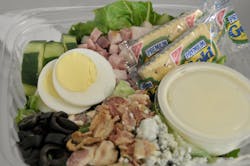1. The Conference for Food Protection, or CFP, is made up of representatives from the food industry, government, academia and consumer organizations who identify and address emerging food safety issues, which lately included micro markets, as they are unattended. Since they are unattended micro markets are not covered in the current FDA Food Code, causing a patchwork of regulations required for licensing and operation.
Micro market operators have already experienced difficulties due to different interpretations of food safety standards when installing micro markets. Health departments are used to dealing with restaurants/convenience stores where there is a person in charge on site or vending machines which protect food products by design. Micro markets are neither, which has led some health departments to require restaurant-style paperwork and licensing, while others allow micro markets to operate under vending machine licenses. The industry, with the help of the national association NAMA, is trying to address this issue. It is a major topic in advocacy and members of NAMA are involved in CFP to help create a guidance document that can be used by health departments when regulating micro markets.
CFP is an organization that identifies and biennially addresses problems of food safety. CFP seeks to balance the interests of regulatory and industry while providing an open forum for the consideration of ideas to promote food safety. While we in the industry, call a self-checkout kiosk or mobile app that allows the purchase of products from shelving/coolers a micro market, CFP considers all those to be industry terms. It, therefore, decided that a new term and definition be established -- Unattended Food Establishment.
At the 2018 CFP biennial meeting, it was recommended that a letter be sent to the FDA requesting an amendment of the FDA Food Code. Specifically, that a food establishment that provides only prepacked foods using a self-checkout system not be required to have a person in charge present during all hours of operation if the following conditions are met
- Entry is not accessible by the general public;
- Food is sold in packages intended for individual retail sale and labeled per LAW;
- Refrigerated equipment for display or sale of TIME/TEMPERATURE CONTROL FOR SAFETY FOOD is equipped with self-closing doors and meets the automatic shut-off requirements for vending machines specified in section 4-204.111;
- The PERMIT HOLDER is responsible for routine service on a scheduled basis and at a frequency acceptable to the REGULATORY AUTHORITY;
- The PERMIT HOLDER has an agreement with the owner of the location that outlines the responsibilities for cleaning and maintenance of all surfaces, equipment and supportive facilities/services acceptable to the REGULATORY AUTHORITY.
- Is under continuous electronic surveillance or similar security precautions as approved by the REGULATORY AUTHORITY; and
- Contact information for the PERMIT HOLDER is continuously and conspicuously posted at the point of sale
2. CFP infers that surveillance can function as the "person in charge" at the micro market, at least in part, since there is no representative from the vending company onsite.
Unattended food establishments need to have surveillance, according to the CFP guidance document. This is because all establishments serving food must have a person onsite acting as the representative of the foodservice company. A micro market has no such person in charge, and therefore needs other ways to ensure food safety. CFP says continuous video surveillance of the areas where consumers view, select, handle and purchase products can be part of the solution to ensure food safety. The cameras must provide video of sufficient resolution to identify situations that may compromise food safety or food defense. The surveillance recording must be kept for 14 days and handed over to regulatory agency within 24 hours of a request.
In addition to video surveillance, another important element to maintaining food safety in a micro market is that it's in a controlled environment. The guideline document even defines this term. Controlled entry means selective restriction or limitation of access to a place or location. This is another step to ensure food safety, and in many states there are already rules about micro markets not being allowed in areas open to the public.
3. The CFP guidance document requires automatic self-locking mechanisms with time/temperature control on all coolers housing food items in unattended locations.
Micro markets must also be equipped with refrigeration or freezer units that have self-closing doors and an automatic self-locking mechanism. This is a way to ensure food safety when no person is onsite and is spelled out in the CFP guidance document for unattended food establishments. There must also be a reasonable attempt made by the operator to dissuade consumers from picking up any packaged food and then returning it.
The automatic self-locking mechanism, also known in the industry as a health lock, is defined in CFP guidance document as an "automatic self-locking mechanism that prevents the consumer from accessing the food upon the occurrence of any condition that results in the failure of the refrigeration unit to maintain the internal product temperature specified under section 3-501.16(A) (2) or freezer unit to maintain the product frozen.”
4.The CFP guidance document is not law, but does influence federal, state and local regulations.
Officially, CFP has no formal regulatory authority, meaning it can't enforce or make laws. However, it is a powerful organization that profoundly influences the adoption of laws and regulations among all government agencies and minimizes different interpretations of the FDA Food Code. The impact of uniform guidance will be positive for micro markets operators. It will mean less differences in requirements across the county or even state lines. While some local health departments may require stricter food safety standards, most will follow the FDA Food Code, although that is not technically a law either.
The FDA Food Code is being adopted by state, county and local health departments to provide foodservice, retail food and vending operations a uniform set of food safety standards to follow across the country. The benefit to operators is that, if the FDA accepts the recommendation from CFP to amend the FDA Food Code, there will be at least, a minimum standard to follow to ensure food safety in micro markets and provide a better understanding of what health departments are concerned about when licensing and inspecting micro markets.
More information can be found at the CFP's website: http://www.foodprotect.org/






